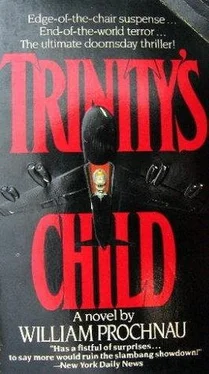“You were a few moments ago, sir. I hope you are now.”
“I’m scared, Harpoon. But only scared of losin’.”
“I’m sorry to hear that. I’m so scared I could use a change of skivvies. Few of the men who devised the war plans, on both sides of the world, were total fools. We built the fear quotient, which we saw as our only salvation, into SIOP. The Soviets did the same. Both sides knew that if this mess ever got started, we would have tremendous problems with ego, national pride, animosities, misunderstandings, communications. Why do you think our world, our hemisphere at least, is not destroyed by now? We certainly had the ability to do it faster. It is now almost five hours since Jericho began.”
“Jericho?”
“Sorry. Jericho is code for a full-scale nuclear war. When we looked at Jericho, we knew communications would go. We knew leaders would die. We saw a system that could be out of control in minutes. So we built in pauses. To some degree, we even matched the equipment to the pauses. The bombers are very slow, which built a natural pause into the war. We are in that pause. Nearing the end of it, though.”
“And the pause was designed by these brightest men,” the successor said, derision in his words, “to do precisely what?”
“To give us time to patch our communications, sir. And to give you and your Soviet counterpart time to stop bluffing and make the Jericho decision.”
Off to the side, Harpoon saw the colonel rise abruptly out of his seat, wagging his head frantically.
“The chicken!” he shouted. “Tell him about cutting the head off the chicken or you’ll… you’ll be remembered with Aaron Burr!”
Harpoon looked grimly at the colonel. Crap, he mouthed silently.
The Foxbats were on their tail now, fifteen miles back, gaining steadily, holding their six remaining missiles for a certain kill. Kazakhs seemed to ignore them. He gave no orders, said nothing. Only the methodical, droning voice of Tyler broke the radio silence. Okay, high terrain three miles, and it’s significant. Up a bit. Down a bit. Little more. Hard left. Good. Kazakhs followed each instruction machinelike. The lightning bolt on his shoulder patch tilted in flawless rhythm with each banking turn around each rolling mountain corner. The white captain’s bars rose in perfect harmony with the aircraft as he lifted it over each mountain ridge. His buttocks swayed in their parachute harness to the geometry of each maneuver. He was good. The Foxbats followed his every move.
“Bandits twelve miles and closing,” Tyler radioed, his voice devoid of emotion. “High terrain at twelve o’clock. Lift it. Dead ahead. Lift it.” Effortlessly the pilot lifted the plane, the captain’s bars also rising. In front of her, Moreau’s screen filled with ominous red clutter. On the right of her screen the yellow groundtracking altimeter, a little thermometer-like image displaying the plane’s height over the ground, plunged rapidly. It bottomed out at twenty-five feet. Ka-whack! The brittle, cracking sound came from the bomber’s spine. Moreau shuddered. The thermometer darted back up, even as Kazakhs nosed the bomber down over the other side of a ridge into a long, shallow valley. She glanced quickly at the pilot. His face remained impassive, his eyes glued on his own screen as they had been since the beginning of the ducking, darting roller-coaster ride through the mountains minutes ago. ‘Too close, pilot,” she said. His eyes held unblinking to the screen. He’s part of the damned computer too, she thought. The Foxbats followed. “Bandits ten miles and closing.”
Kazakhs dropped the aircraft low into the valley. He had taken his pursuers on a long zigzag chase through the frozen mountains. He was back now, almost where he started, one ridge from the delta. In front of him the red screen still danced in leaping signals of danger, a vivid tableau he read as naturally as he had read the green screen just hours ago, taking his toy aliens up against the canyon wall. His mind was blank, as it had been then, his various other worlds excluded. No room to think. Thinking caused fuck-ups. Thinking would tell him that it was him or them, perhaps even bring in the emotion of fear. So his mind read the computer and sent light-speed signals to the fingers adept at so many tasks. He had taken the aliens up against the wall. He knew their secrets. But they never stopped chasing.
Long ago Kazakhs had accepted the inevitability of succumbing—somewhere—a minor slip, a SAM battery in Tiksi, a MIG roaring out of some niche in the Baikals, suicidal in its determination to save kids and lovers and parents in the city on the lake. Or simply sputtering engines, Elsie -style, and a crash somewhere in the wilderness short of the Chinese escape city. But not in a bleak and frozen valley in the Canadian Yukon, which he saw only in red computer images. “Bandits eight miles and closing.” He felt very tired.
“We’ve lost, Kazakhs,” Moreau said softly.
He stared into the red screen, a vivid computer-game house of horrors now. The last flight of the Polar Bear, his mind said, thoughts finally invading its sanctum. He turned and looked at her, pain but not fear in his eyes.
“They’re taking their own sweet time, aren’t they?” Moreau’s voice was soothing and also unfrightened. She was readier than she thought, and had been, she realized, for some time.
Kazaklis broke his silence, still blustering. “You shovelin’ decoys back there, Halupalai?” Then he went on private, his voice dreary. “Cat’s got the mouse, Moreau, and he’s playing.”
“You gave it a classy run through the hills, Kazaklis.”
The pilot ignored the compliment. “They really screwed up on the first pass. They’ll close a couple more miles. All they gotta do is stay away from Halupalai’s guns.”
“Don’t imagine that has them terrified.”
“No. Not four of ’em with six missiles left.”
They went quiet again, the bomber noise rattling through their silence like a tin can full of loose pebbles as it raced along the valley floor. Kazaklis tapped the throttles, edging the speed back up toward Mach point-nine. His sweeping, swaying evasive maneuvers turned halfhearted, seeming to invite the missile launches. Then he reached over and nudged his copilot. “Maybe we oughta give ’em one more thrill,” he said, his voice impishly childlike.
Moreau looked at him and saw the brown eyes twinkling again, the perfect white teeth gleaming. “Don’t give me that sucker-bait Boom-Boom Room smile of yours, macho man,” she said. But she smiled, too.
“Bandits seven miles and closing,” the radio squawked.
“What if I put this hunk in a loop and came back on top of ’em?” Kazaklis chuckled. “Maybe they’d all die of heart attacks, huh?”
“Jesus, Kazaklis,” Moreau said, smiling at his childishness. “The wings would snap like twigs.”
“Maybe the shrapnel would get ’em.”
“Yeah. Maybe.”
“Sure surprise the shit out of ’em.” Kazaklis continued chuckling quietly, then peered sheepishly around the corner of his helmet. “Not such a good idea, huh?”
“Kazaklis, you really are a case,” Moreau said. “Born a couple of generations too late. You should have been a barnstormer, the Great Waldo Pepper defying death and deformity for the hayseeds in Iowa. Till you piled in, a legend.”
“Woulda lived longer,” he said pensively. But his voice changed pitch almost immediately. “The Great Kazaklis. Yeah. With you strapped to the struts of my Sopwith Camel.”
“Then you’d have to share the glory. You wouldn’t like that.”
“Naw, suppose not.” Then he laughed uproariously. “With your knockers, lady. Share the glory with your knockers. Them homy old farmers would just be a-twitchin’, waitin’ for a look at the tits when your blouse blew off.”
Читать дальше












